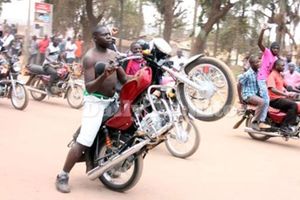Uganda's human rights defenders face dire situation - report

MRr Robert Sempala, the Executive Director Human Rights Network for Journalists Uganda launches the report on human rights defenders in Kampala on Thursday. PHOTO | SHABIBAH NAKIRIGYA
What you need to know:
- Additionally, the report notes that some individuals posing as HRDs are actually businesspeople seeking funds, highlighting the need for policies to regulate HRD operations.
Uganda's Human Rights Defenders (HRDs) are facing a dire situation, with 65 per cent of them lacking access to emergency protection services, leaving them vulnerable to threats and torture.
A report by the National Coalition of Human Rights Defenders Uganda (NCHRDU) reveals that only 35 per cent of HRDs can access these services nationwide.
"The HRDs who access emergency protection services are mainly in urban areas, while those at the grassroots level face significant challenges," the report states.
Mr Robert Kirenga, Executive Director of NCHRDU, notes that HRDs' work is inherently risky.
"When HRDs encounter challenges, they need a fallback to seek support and remedy for protection, but we've found that few can access emergency protection services," he says.
Mr Kirenga explains that the study focused on emergency and protective measures in place for HRDs because their duty is a high-risk job.
"Most of the time, when they are in the field, they face a lot of challenges," he said.
Ms Pamela Angwech, an HRD from Gulu District, highlights land conflict and grabbing as major challenges.
"Youth, women, and children are the most vulnerable categories of people when it comes to land ownership and resettlement. They're not given a chance to exercise their rights," she said.
Angwech advocates for extending the 90-day protection service based on the type of case. "HRDs handle different cases with varying levels of threats. The 90-day protection service should be tailored to the specific case."
The report also recommends widening the definition of HRDs to include social movements and active politicians exercising their right to participate in politics.
Additionally, the report notes that some individuals posing as HRDs are actually businesspeople seeking funds. This highlights the need for policies to regulate HRD operations.
Mr Robert Sempala, Executive Director of the Human Rights Network for Journalists Uganda, believes the report is timely. "It will help us scale our level of penetration and relevance to improve and identify gaps."




